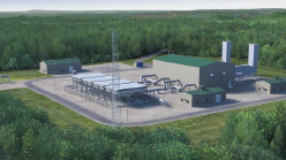Knowledge Management for the Natural Gas Transmission Industry
Executive Summary
The natural gas industry and the people it serves would benefit if companies were to implement a more robust process to capture knowledge. Most companies – both inside and outside of the interstate natural gas pipeline industry – fail to “own” the “institutional” knowledge that is critical to company success such as data files, business histories, and business processes. Knowledge management is an important tool to support the safe and reliable operation of the North American natural gas pipeline industry, and companies must make a greater effort to retain employee knowledge.
The INGAA Foundation, Inc. commissioned the report “Knowledge Management for the Natural Gas Transmission Industry” to help natural gas transmission companies understand and successfully navigate the challenge of managing knowledge in the coming years. This report builds on the 2007 INGAA Foundation Workforce development study that, among other things, recommended the development of actions to maintain company knowledge for training new employees, improving process and improving the quality of decisions. Knowledge assets become valuable to an organization when they can be accessed and utilized by in support of the organization’s goals and objectives. To this end, it is necessary for the organization to have processes in place to identify critical knowledge, capture and store it, and retrieve it for use when needed.
This paper addresses the imperative for utilizing the capabilities of knowledge management in the natural gas transmission industry. This paper provides an introduction to knowledge management with a focus on developing a process for natural gas transmission companies to manage knowledge assets effectively. A brief summary of best practices and common knowledge management tools and techniques is presented, but the main focus is on “why to”( instead of the “how to”) implement knowledge management. The case is made that a strong knowledge management program provides a path for achieving greater safety and efficiency in every organization and is especially critical to those experiencing significant growth and change, as is the case of the natural gas transmission industry.
Knowledge Management Background
Knowledge management is the strategy, processes, practices, methods and technology that enable an organization to create, maintain and leverage its individual and collective knowledge to achieve its goals. Below is a chart that displays graphically some of the keys of knowledge management.
The Keys of Knowledge Management
Briefly, knowledge management involves: (1) getting people the right information at the right time so that they can perform and act competently (knowledge transfer), (2) helping people share information across boundaries in ways that will measurably benefit the organization, and, (3) producing new knowledge that leads to improved quality and service, intellectual and technological advancements, new products, capabilities, and processes/practices, and increased competitiveness and profitability.
Making the Case for Knowledge Management in the Natural Gas Transmission Industry
The natural gas industry is in the midst of a growth a cycle. A recent INGAA Foundation study projected natural gas consumption in the U.S. and Canada will increase by an average of 1.6% per year through 2035. Total natural gas used across all sectors electric generation, industrial, commercial and residential—is projected to rise to about 110 Bcfd in 2035. U.S. and Canadian natural gas supplies are projected to grow by 38 Bcfd from about 75 Bcfd in 2010 to about 113 Bcfd in 2035. New infrastructure will be required to move natural gas from regions where the production is expected to grow to areas where demand is expected to increase. New supplies entering the interstate pipeline system may require significant investments in added pipeline capacity to handle the projected increase in natural gas transportation. As gas demand and production continue to grow, so will demand for pipeline services.
Along with growth the natural gas pipeline industry also must contend with a competitive market, greater public concern and increasing regulatory oversight. The safety and reliability of the natural gas industry has been safeguarded over the years in part, by a stable force of experienced professionals; men and women who are experts in pipeline construction and operations. This knowledge matters: studies show that experienced workers are more efficient, more reliable, and make significantly fewer errors than less experienced colleagues.
This critical asset could dissipate as older employees retire and exit the workforce. Unfortunately, many pipeline companies struggle to record and document fully the unique knowledge of their best employees before they leave. As a result, the natural gas industry is entering a period of rapid expansion, increased market competition, and heightened scrutiny. The risk is that the industry may not have the benefit of its collective knowledge.
The key to meeting this challenge is knowledge management, the process of capturing, storing and sharing knowledge within a company to assure high competence at all levels of the organization. Knowledge is more than employee skills; it includes everything the company needs to run its business successfully, including data files, business histories, past projects, technical documents, business processes, product data, trade secrets, etc. The goal of knowledge management is to make every decision, at every level, with the benefit of the full knowledge base of the company.





